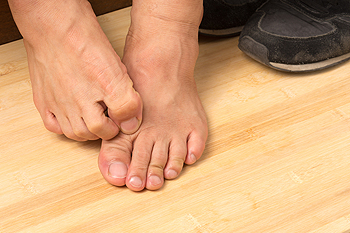What Should I Do if I Have Athlete's Foot?
Monday, 19 October 2020 00:00 Tinea pedis, or Athlete’s foot as it is more commonly known, is a fungal infection of the skin and feet. It typically affects the spaces between the toes and is characterized by cracked, scaly skin. This infection is contagious and can be spread through contact with infected skin flakes or through contact with fungi in damp areas, such as public swimming pools. If you find yourself with athlete’s foot, it is important to keep the feet clean, dry, and cool, as the fungus thrives and multiplies in warm, moist environments. You should also avoid public swimming pools, public showers, and foot baths. Wear sandals if possible, or air out your shoes by alternating them every 2-3 days. Avoid wearing socks made from fabrics like nylon, which do not dry easily. Finally, follow your doctor’s prescribed treatments, which can include topical or oral antifungal medications. If you think that you may have athlete’s foot, it is suggested that you seek the care of a podiatrist.
Tinea pedis, or Athlete’s foot as it is more commonly known, is a fungal infection of the skin and feet. It typically affects the spaces between the toes and is characterized by cracked, scaly skin. This infection is contagious and can be spread through contact with infected skin flakes or through contact with fungi in damp areas, such as public swimming pools. If you find yourself with athlete’s foot, it is important to keep the feet clean, dry, and cool, as the fungus thrives and multiplies in warm, moist environments. You should also avoid public swimming pools, public showers, and foot baths. Wear sandals if possible, or air out your shoes by alternating them every 2-3 days. Avoid wearing socks made from fabrics like nylon, which do not dry easily. Finally, follow your doctor’s prescribed treatments, which can include topical or oral antifungal medications. If you think that you may have athlete’s foot, it is suggested that you seek the care of a podiatrist.
Athlete’s foot is an inconvenient condition that can be easily reduced with the proper treatment. If you have any concerns about your feet and ankles, contact Dr. Lee R. Stein from Lake Shore Foot & Ankle, PC. Our doctor will treat your foot and ankle needs.
Athlete’s Foot: The Sole Story
Athlete's foot, also known as tinea pedis, can be an extremely contagious foot infection. It is commonly contracted in public changing areas and bathrooms, dormitory style living quarters, around locker rooms and public swimming pools, or anywhere your feet often come into contact with other people.
Solutions to Combat Athlete’s Foot
- Hydrate your feet by using lotion
- Exfoliate
- Buff off nails
- Use of anti-fungal products
- Examine your feet and visit your doctor if any suspicious blisters or cuts develop
Athlete’s foot can cause many irritating symptoms such as dry and flaking skin, itching, and redness. Some more severe symptoms can include bleeding and cracked skin, intense itching and burning, and even pain when walking. In the worst cases, Athlete’s foot can cause blistering as well. Speak to your podiatrist for a better understanding of the different causes of Athlete’s foot, as well as help in determining which treatment options are best for you.
If you have any questions please feel free to contact one of our offices located in Chicago, Highland Park, and Uptown, IL . We offer the newest diagnostic and treatment technologies for all your foot and ankle needs.







